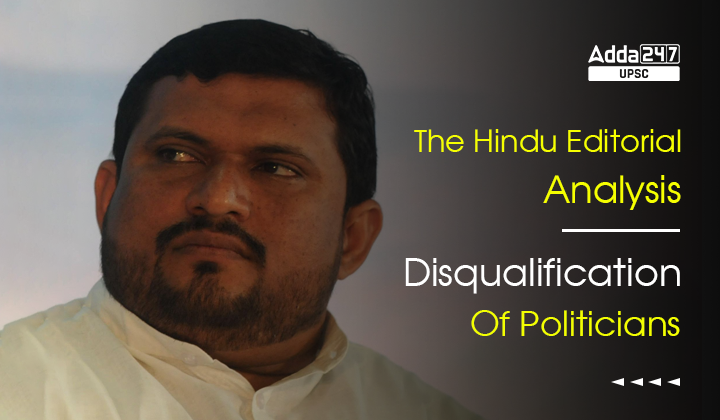Table of Contents
The Hindu Editorial Analysis, Disqualification Of Politicians
Today’s The Hindu Editorial Analysis Is Based On The Issue That whether disqualification Of Politicians For Conviction Is Final Or Whether It Can Be Revoked.
What Is The Issue?
- Nationalist Congress Party leader P.P. Mohammed Faizal was convicted by the Kavaratti sessions court(Kerala) on January 11 for attempt to murder, and sentenced to 10 years imprisonment.
- On January 13, the Lok Sabha announced that he was disqualified as an MP with effect from the date of conviction.
- On January 18, the Election Commission of India (ECI) fixed February 27 as the date for by-election to that constituency, with the formal notification to be issued on January 31.
- Meanwhile, Mr. Faizal appealed to the Kerala High Court for a stay on his conviction and sentence, which the High Court suspended on January 25.
What Did The Kerala High Court Say?
- The Kerala High Court said that the consequence of not suspending the conviction is drastic not just for Mr. Faizal but also for the nation.
- The cost of a parliamentary election would have to be borne by the nation and developmental activities in Lakshadweep will also stop for a few weeks.
- The elected candidate will have just 15 months to function till the end of the term of the current Lok Sabha. Given these exceptional and irreversible consequences, it suspended his conviction until disposal of the appeal.
- Mr. Faizal challenged the ECI’s announcement in the Supreme Court of India. On January 30, the ECI said it was deferring the election.
- The question now is whether Mr. Faizal will automatically resume his membership of the Lok Sabha. The answer lies in deciding whether the cancellation of disqualification takes effect from January 25 (when the High Court suspended the conviction) or whether the clock can be rolled back to the date of conviction and disqualification.
Specific Provisions For Disqualification Of Politicians
Article 102 of the Constitution
- The provision for disqualification is given in Article 102 of the Constitution.
- It specifies that a person shall be disqualified for contesting elections and being a Member of Parliament under certain conditions. The conditions include:
- Holding an office of profit,
- Being of unsound mind or insolvent, or
- Not being a citizen of India.
- It also authorises Parliament to make law determining conditions of disqualifications. There are analogous provisions for members of state legislatures.
The Representation of the People Act, 1951
- The Representation of the People Act, 1951 provides that a person will be disqualified if convicted and sentenced to imprisonment for two years or more.
- The person is disqualified for the period of imprisonment and a further six years.
- Exception For Sitting Members: There is an exception for sitting members; they have been provided a period of three months from the date of conviction to appeal; the disqualification will not be applicable until the appeal is decided.
Important Judgements On Whether Disqualification For Conviction Is Final Or It Can Be Revoked
K. Prabhakaran vs P. Jayarajan 2005
- The differential treatment of candidates for elections and sitting members was challenged under Article 14 (right to equality).
- A Constitution Bench of the Supreme Court, in 2005 (K. Prabhakaran vs P. Jayarajan), decided that the consequences of disqualifying a contestant and a sitting member were different.
- In the latter case, the strength of the party in the legislature would change, and could have an adverse impact if a government had a thin majority. It would also trigger a by-election.
- Therefore, it was reasonable to treat the two categories differently.
- The Court also considered whether in case of a disqualified candidate who is later acquitted, the disqualification would be removed with retrospective effect. It stated that this could not be done as this would require the results of the election to be cancelled. Therefore, the removal of disqualification would be prospective and for future elections.
Lily Thomas vs Union of India(2013)
- In 2013, a two-judge Bench of the Supreme Court stated that Article 102 empowers Parliament to make law regarding disqualification of a person “for being chosen as, and for being, a member of either House of Parliament”.
- It interpreted this phrase to mean that whereas Parliament could specify conditions for disqualification, those conditions would apply equally to candidates and sitting members.
- Therefore, the exception carved out for sitting members was unconstitutional.
- The judgment further cited Article 101 that if a Member of Parliament was disqualified under Article 102, “his seat shall thereupon become vacant”.
- Therefore, the disqualification was automatic and had immediate effect if the conditions of Article 102 were met.
- The judgment stated that a disqualified person may obtain a stay on his conviction, and cited an earlier 2007 judgment that the disqualification would be removed from the date of the stay order.
- The judgment, however, also stated that a disqualified person may obtain a stay on his conviction, and cited an earlier 2007 judgment that the disqualification would be removed from the date of the stay order.
Conclusion
The Lily Thomas judgment(2013) requires the seat to be vacated immediately upon disqualification whereas the Kerala High Court’s stay in the case of P.P. Mohammed Faizal tries to ensure that the MP retains the seat until the appeal is decided. Hopefully, the Apex Court clear the case as it will be impacting similar instances.



 TSPSC Group 1 Question Paper 2024, Downl...
TSPSC Group 1 Question Paper 2024, Downl...
 TSPSC Group 1 Answer key 2024 Out, Downl...
TSPSC Group 1 Answer key 2024 Out, Downl...
 UPSC Prelims 2024 Question Paper, Downlo...
UPSC Prelims 2024 Question Paper, Downlo...





